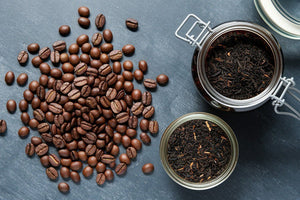Caffeine is one of the most widely used drugs in the world, and in the world of health and fitness, it’s something we’re obsessed with.
Research by The British Coffee Association has discovered that:
- In the UK, we drink approximately 55 million cups of coffee per day. (Research by The British Coffee Association)
- Gimoka has found that people in the UK drink 70 million cups of coffee per day, compared to 165 million cups of tea. Average British male coffee drinker drinks 13 cups per week, while average British female coffee drinker drinks 11.
What does caffeine do?
Caffeine is addictive, ask any coffee lover, but what does it actually do? Caffeine is a central nervous system stimulant best known for its effect on tiredness, making you feel more focused and alert. For someone who never consumes caffeine, the increase may make them shake and talk faster, but after a while a tolerance is developed.
Once caffeine hits your bloodstream (about 45-60 minutes after ingestion) it does more than just wake you up. Blood pressure, pulse rate, and stomach acid production are increased, fat stores are broken down, and fatty acids are released into the bloodstream. But just like with the shakes, after a time a tolerance is developed and a regular user will experience reduced effects. It’s caffeine’s ability to break down fat which is particularly important in athletic performance which we’ll explore later on.
How long does caffeine take to kick in?
It takes 45-60 minutes for caffeine to reach it’s highest levels in the blood stream, however you will notice the effects of caffeine after just 10 minutes. The half-life for caffeine is 4-6 hours which means that after this time, 50% of the caffeine originally consumed is still in the bloodstream. This means that if you were to drink a cup of coffee at 5pm, there would still be 50% of the caffeine in your system by bedtime.
What is pre workout?
Pre workout is a powder or tablet designed to be taken before a training session in order to increase your focus and athletic performance by pumping you up and giving you more energy. Pre-workout often contains large amounts of caffeine, as it not only makes you more alert, motivated, and focused on your workout, caffeine has the ability to increase pain tolerance during exercise, meaning you can lift more before fatiguing.
Caffeine's effect on pain has been explored in more than just the workout world, with common pain relief tablets such as paracetamol and ibuprofen now containing caffeine, which is thought to make the pain relief more effective.
Is coffee the best pre-workout ever?
The most popular effects of any pre workout are alertness, increased focus, minimal fatigue, boosted strength and fat loss. The average cost of a pre workout will set you back about £30, which is a price we'd happily pay for all these benefits, right? However caffeine can have all of these effects at a fraction of the cost.
Research by the International Journal of Sports Nutrition and Exercise Metabolism found that exercisers who had 4.5 mg of caffeine per kilogram of body weight burned more calories and during an hour-long cardio session they had an increased energy expenditure of 15% for up to 3 hours compared to those who only received a placebo.
The average cup of coffee has anything from 100mg-200mg of caffeine. The additional calorie burn happens due to the extra energy costs of ventilation.
Caffeine gives you the energy to work harder and therefore burn more calories in order to recover.
The average pre workout has approximately 150 - 300 mg of caffeine.
Want to save your pennies? Try coffee pre workout for your caffeine fix.
How much caffeine?

|
Food |
Caffeine Content per 100g |
|
Dark Chocolate |
43mg |
|
Coffee (brewed) |
20mg |
|
Coke |
8mg |
|
Red Bull |
30mg |
|
Tea |
20mg |
|
Aspirin |
65 mg (per serving) |
Benefits of caffeine
A recent document published on the caffeine informer found that caffeine can potentially create effects such as:
- Increased memory. A study by Johns Hopkins University showed that a 200mg caffeine pill helped boost memory consolidation.
- Caffeine combined with carbohydrates helps replenish muscle glycogen concentrations faster after exercise.
- Caffeine helps keep you alert while driving during periods of sleep restriction.
- Caffeine can stimulate hair growth on balding men and women, however the amount of caffeine needed for this effect is the equivalent of about 60 cups of coffee.
- Caffeine relieves post-workout muscle pain by up to 48%.
- Caffeine helps improve memory.
- Caffeine increases stamina during exercise.
- People who consume caffeine have a lower risk of suicide.
- Caffeine improves reaction times
- Caffeine may help those trying to lose weight: Research out of Germany showed that weight loss study participants who drank 2-4 cups of caffeinated coffee a day were more likely to be successful at keeping the weight off than those who did not consume caffeine.







